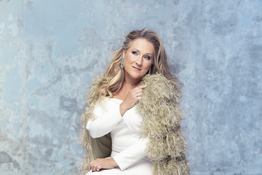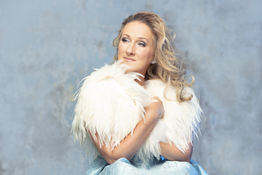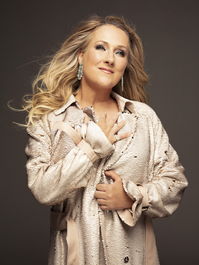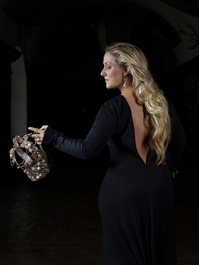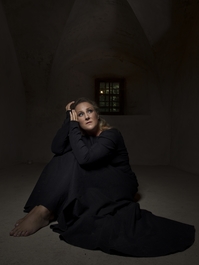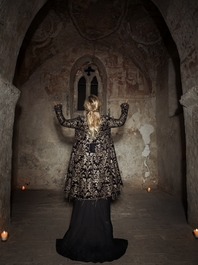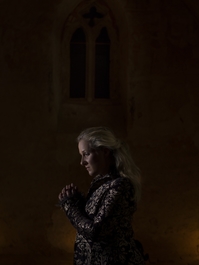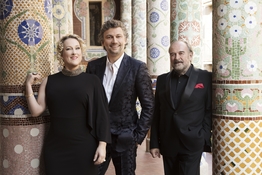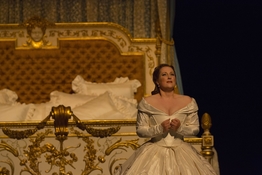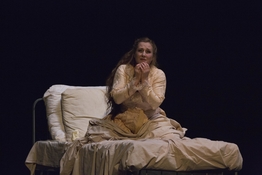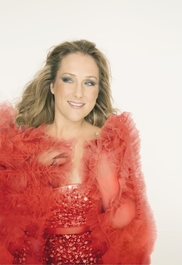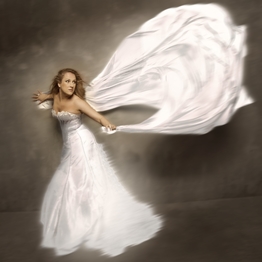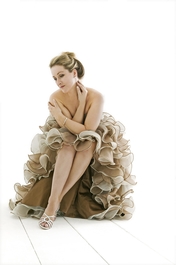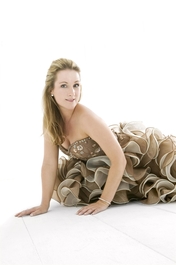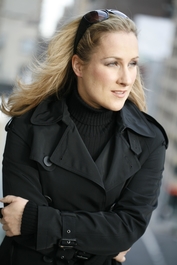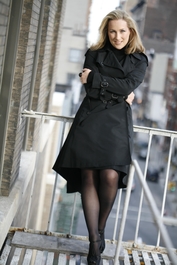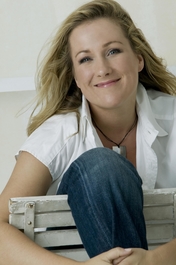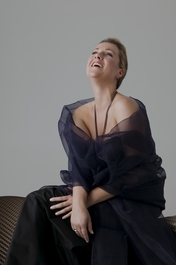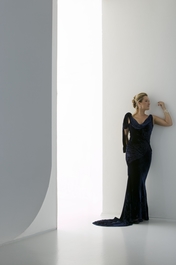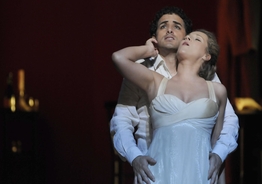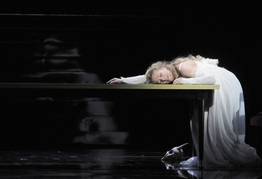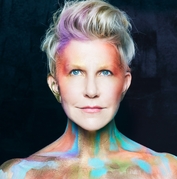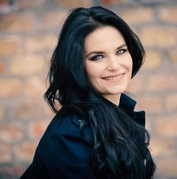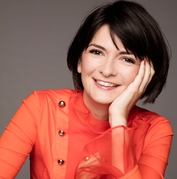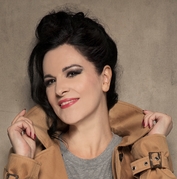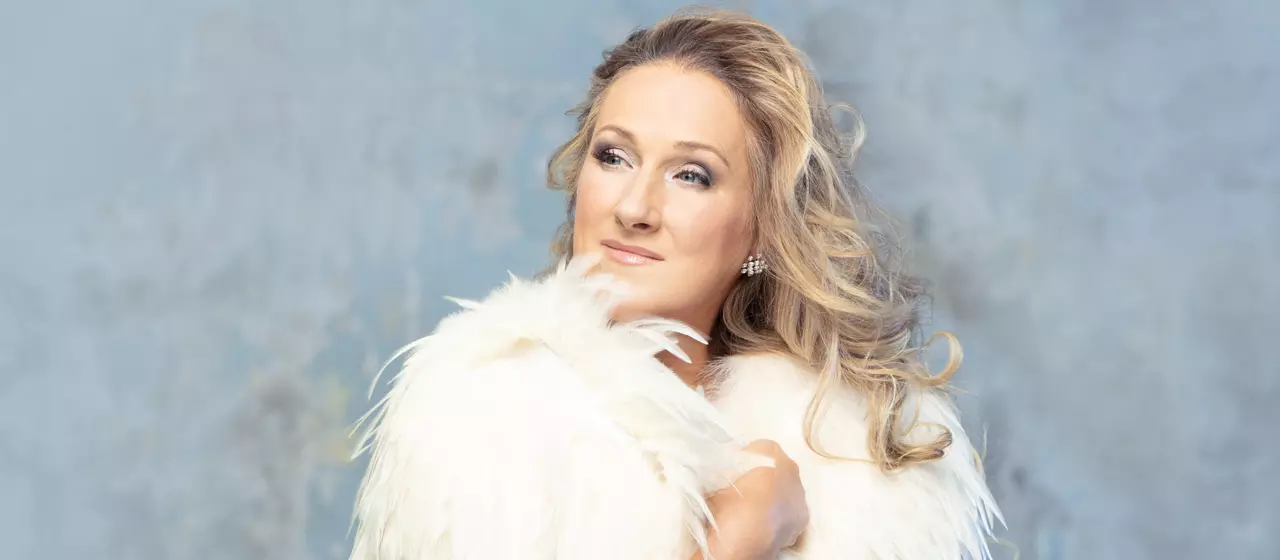

Diana Damrau
News
Diana Damrau records Tudor Queens
Soprano Diana Damrau assumes the crowns of three different Queens of the Tudor period in England: Anne Boleyn, the second of Henry VIII’s six wives; Mary, Queen of Scots, and Elizabeth I, the Virgin Queen. Each of them is the central character in an opera by Donizetti: Anna Bolena (1830), Maria Stuarda (1835) and Roberto Devereux (1837). The substantial and climactic final scenes of all three works place the queen in extremis: Anne has been condemned to death by her husband; Mary has been condemned to death by her cousin Elizabeth, and Elizabeth – Anne’s daughter – has condemned to death the man she loves, Robert Devereux, Earl of Essex.
Donizetti’s particular brand of bel canto is often perceived in terms of vocal pyrotechnics – most famously the Mad Scene in Lucia di Lammermoor, an opera which has brought Diana Damrau triumphs at the world’s leading opera houses. The three extended scenes on this album give the soprano plentiful opportunities to display her spectacular technique and interpretative insight, but they also demonstrate the composer’s skills in building tension and drama of cumulative power. Antonio Pappano, here conducting in his capacity as music director of Rome’s Accademia Nazionale di Santa Cecilia, is also, of course, music director of London’s Royal Opera House; he is a master at shaping an operatic score and bringing out the absolute best in singers.
As yet, Maria Stuarda is the only one of these three operas that Damrau has sung complete on stage. When she performed it at the Zurich Opera in 2018, the UK’s Opera magazine wrote. “As Mary, Queen of Scots, Damrau won her audience over with her perfect control, richness of nuance and faultless intonation,” while the Neue Zürcher Zeitung praised the way “she traced the human development of the Scottish queen … with complete credibility. She commands a voice that seems to have no limits. Her coloratura is stunning, her vocal range impressive, and her dynamic shadings are breath-taking. Damrau is in a class of her own.”
Diana Damrau describes the three queens as “strong, vulnerable women who have to subordinate their personal desires to the duties of the Crown ... Life-and-death decisions are part of their daily life ... In these more or less historically authentic operas Donizetti gives them an infinite emotional dimension ... Above all he shows these queens in all their femininity … their capacity for love, their gentleness, longing, vulnerability, allure, strength, faith, vanity, greed, ruthlessness, resolve, toughness, sense of responsibility and power, fury, despair, powerlessness, hopelessness and sorrow … Underlying everything is a fear of death.
“Donizetti’s music gives the voice the greatest freedom and support with atmosphere, energy and the most beautiful melodies,” she continues. “There are heavenly moments when it feels as if time is standing still … To interpret this music the singer needs to be absolutely committed and trusting, but also ready to take risks.”
Diana Damrau joins forces with Mariss Jansons, Helmut Deutsch and the Bavarian Radio Symphony Orchestra to present the most loved of all Strauss’s songs
“For me, Strauss is one of the greatest composers,” Diana Damrau has said. “The way he handles the soprano voice is a joy. And to be able to sing his music with my voice feels like coming home.”
The soprano literally shares a home with Richard Strauss in that she, like the composer, was born in Bavaria. She studied at the conservatory in the Bavarian city of Würzburg, and went on to join the company at its Mainfrankentheater before making an international reputation – not least in such soaring Strauss roles as Zerbinetta in Ariadne auf Naxos, Sophie in Der Rosenkavalier and Aithra in Die Ägyptische Helena.
The centrepiece of Diana Damrau’s album of Strauss songs is the Vier letzte Lieder (Four Last Songs), recorded in January 2019 with the Bavarian Radio Symphony Orchestra and its long-standing Chief Conductor Mariss Jansons. Sadly, but also somehow poetically, these ‘songs of farewell’, performed by Damrau and the BRSO, became part of the last concert that Jansons ever conducted, in New York, just weeks before his death on November 30th, 2019.
When they performed the songs together at London’s Barbican Hall in early 2019, the Evening Standard wrote “Today Diana Damrau is their most celebrated interpreter, and this performance showed why,” while the Financial Times declared, “Lucky the soprano who has Mariss Jansons as her conductor.” The Times praised the way Damrau “summoned majestic surges of tone out of the most daring pianissimos,” and, extolling the orchestra’s performance in the concert, described “such sonic splendour, such a revelation of details, such virtuosic drive and soloistic character.”
Soprano, conductor and orchestra also unite for perhaps the best loved of all Strauss’s songs, the serene ‘Morgen’ (Tomorrow), but the rest of the album is devoted to songs with piano, played here by Helmut Deutsch. A native of Vienna, Deutsch is one of the world’s most distinguished collaborative pianists and joined Diana Damrau and Jonas Kaufmann on the recording of Hugo Wolf’s Italienisches Liederbuch that Warner Classics released in early 2019.
Damrau and Deutsch’s programme, which intersperses some of Strauss’s best-loved songs with comparatively rarely heard numbers, ranges from the exuberant (such as ‘Einerlei’) to the heart-breaking (‘Befreit’) and includes two small song cycles: the five Mädchenblumen, which portray girls as flowers in ornamental musical terms, and, written some 30 years later in 1918, the expressionistic Lieder der Ophelia, based on Shakespeare’s Hamlet.
Damrau first began singing Strauss songs as a student: “I loved Strauss straight away. Not only is the music gorgeous, there’s the way he combines words and notes – and the psychology … Strauss was a connoisseur of the voice, especially the high voice, thanks to his wife, the soprano Pauline de Ahne. He gave the voice momentum.”
2018 BBC Proms line-up revealed: Joyce DiDonato, Jean Rondeau and more!
The BBC Proms has revealed its 2018 programme, with several French classical stars making their Proms debut.
On 5 September, Joyce DiDonato reprises the role of Dido in highlights from Berlioz's Les Troyens, this time with John Eliot Gardiner and his Orchestre Révolutionnaire et Romantique. The American mezzo's recent recording with the Orchestre Philharmonique de Strasbourg and maestro John Nelson won the BBC Music Magazine Award for Best Opera Album earlier this month.
French coloratura soprano Sabine Devieilhe will take to the Royal Albert Hall stage for the first time on 26 July in Debussy's sensual cantata La Damoiselle élue, marking the centenary of the French composer's death. She sings Debussy on her latest album of French arias and songs, Mirages.
In another important French debut, Romantic pianist extraordinaire Bertrand Chamayou plays Mendelssohn's First Concerto on 20 July, with the BBC National Orchestra of Wales.
At Cadogan Hall, on 23 July, Jean Rondeau: another Frenchman in another Proms debut, this time an all-French harpsichord recital including music by Royer (from his album Vertigo), François Couperin and a world-premiere by Eve Risser.
Violinist Renaud Capuçon was in London recently for the launch of his Bartók concertos album with the London Symphony Orchestra. He returns 19 August with the Orchestre de la Suisse Romande as soloist in an orchestration of the Ravel Violin Sonata in G Major.
Soprano Diana Damrau sings her heartland repertory, songs by Richard Strauss, with the Royal Liverpool Philharmonic Orchestra and Vasily Petrenko.
A conductor very much familiar to London audiences, Sir Antonio Pappano, brings his Italian Orchestra dell'Accadamia Nazionale di Santa Cecilia to town for Bernstein's Symphony No.1 marking the centenary of the American composer's birth in August. Pappano has recorded the complete Bernstein Symphonies and The Age of Anxiety with the same orchestra and pianist Beatrice Rana for release later this year.
Discover the complete 2018 BBC Proms line-up here.
Diana Damrau, Bryan Hymel & brothers Capuçon to perform under the Eiffel Tower
- Berlioz – La Damnation de Faust : Marche Hongroise / Orchestre seul
- Puccini – Gianni Schicchi « O mio babbino caro » / Nadine Sierra
- Verdi – Rigoletto « La donna è mobile » / Bryan Hymel
- Prokofiev – Roméo et Juliette « Danse des Chevaliers » / Orchestre seul
- Mozart - Don Giovanni « Deh vieni alla finestra » / Ludovic Tézier
- Mozart - Don Giovanni « Fin ch’han dal vino » / Ludovic Tézier
- Gounod – Roméo & Juliette : « Je veux vivre» / Diana Damrau
- Rimsky-Korsakov – La Fiancée du Tsar « La chanson du houblon» / Orchestre + chœur
- Gounod – Sapho « O ma lyre immortelle » / Anita Rachvelishvili
- Brahms – double concerto « Vivace non troppo (3ème mvt) » / G.& R. Capuçon
- Kabalevsky / A. Cottee – «Bonne Nuit» / Maîtrise de RF
- Leoncavallo – Pagliacci «Vesti la Giubba » / Bryan Hymel
- Chostakovitch – Suite de Jazz n°2 « Valse n°2 » / Orchestre seul
- Delibes – Lakmé «Duo des fleurs » / Nadine Sierra + Anita Rachvelishvili
- R. Strauss – Morgen / D. Damrau + R. Capuçon
- Vangelis / Don Rose – « Les Chariots de feu »(version pour piano et orchestre ) / Orchestre seul
- Puccini – La Bohème « O soave fanciulla » / Nadine Sierra + Bryan Hymel
- Moussorgsky / Ravel – Les Tableaux d’une exposition « la grande porte de Kiev » / Orchestre seul
- Verdi – Don Carlo «E lui !... desso ! ...» / B.Hymel + L.Tézier + Choeur RF
- Bizet - Carmen «Les voici la quadrille ! » / Orchestre + chœur + Maîtrise
- Berlioz/ Rouget de Lisle – La Marseillaise (couplet n°1 * 2)
Diana Damrau : soprano
Nadine Sierra : soprano
Anita Rachvelishvili : mezzo-soprano
Bryan Hymel : tenor
Ludovic Tézier : baritone
Renaud Capuçon : violin
Gautier Capuçon : cello
Maîtrise de Radio France Chœur de Radio France
Sofi Jeannin : choral direction
Orchestre National de France
Valery Gergiev : direction
Christian Knapp : chief assistant
Diana Damrau takes a stand against animal cruelty on the cover of her new album
German soprano Diana Damrau’s new album, Grand Opera, presents the genre at its most grandiose and opulent. It features eleven dazzling arias and duets by Giacomo Meyerbeer (1791-1864), a composer synonymous with the splendours of Parisian grand opéra and a major influence on the two titans of Romantic opera, Verdi and Wagner.
Diana Damrau meets Meyerbeer’s vocal challenges with a fusion of brilliant coloratura, lyricism and dramatic power. She is also an artist who embodies the glamour and elegance of opera’s great divas. Nonetheless, on the cover of her new album she challenges the perception of luxury and extravagance synonymous with opera and diva antics.
Although many of her iconic predecessors – Maria Callas, Victoria de los Angeles, Renata Scotto, Beverly Sills, Leontyne Price and Marian Anderson to name just a few – were often photographed draped in plush mink coats and stoles, Damrau has taken a stand, making the modern-day diva decision to wear haute couture fake fur.
In Jürgen Frank’s stunning photographs for the cover of Grand Opera, Damrau chose to champion New York fashion house Pelush, pioneering makers of luxury faux fur. According to Pelush founder, Milan-born designer Anna Tagliabue, these creations are “ecologically sensitive and cruelty-free…a wonderful alternative for the modern woman”.
“Pelush’s stunning faux fur made me feel like Cinderella at the ball,” said Diana Damrau.
The coloratura soprano hopes that the garment and styling for Grand Opera will capture the essence of Meyerbeer, “a composer of indispensible French works whose effortless sensuality, beauty and elegance are unparalleled”.
Diana Damrau’s album Grand Opera – Meyerbeer arias – will be released in May, 2017.
Twelve major prizes for Warner Classics artists in the ECHO Klassik Awards
It’s the second year in a row that Warner Classics and Erato have taken the lion’s share in the ECHO Klassik Awards, the prestigious German classical music prizes revealed today. Artists from the two labels claimed a total of twelve accolades for excellence in classical recording and performance, including one for the Warner Classics-distributed Euroarts DVD label.
Philippe Jaroussky has been crowned Singer of the Year for the second time (his 5th ECHO Klassik) – the only countertenor ever named in this category to date. He receives the prize for his album Green, a journey through French chanson settings of poetry by Paul Verlaine.
From the Francophile flair of his last recital album, Jaroussky chose to sing in German for the first time for his highly-anticipated recording of Bach and Telemann cantatas with Freiburg Baroque Orchestra, to be released in October. And as this year’s artist in residence at the Norddeutscher Rundfunk in Hamburg, set to sing at the opening night of Hamburg’s new concert hall Elbphilharmonie, he has developed stronger connections to German musical life than ever before.
Conductor of the Year goes to Antonio Pappano for his monumental studio recording of Aïda. The Italian-British maestro recorded Verdi’s masterpiece with an all-star cast (including Anja Harteros and Jonas Kaufmann) in Rome and received international critical acclaim, including the BBC Music Award for Album of the Year and a Diapason d’Or.
Diana Damrau is the second Erato singer who picks up a prize this year, for her tour-de-force Violetta in the Paris Opera production of Traviata released on DVD (Music DVD Production of the Year: Opera).
Young French cellist Edgar Moreau receives the ECHO Klassik 2016 as Newcomer of the Year for his Baroque album Giovincello, on which he brings his youthful energy and virtuosic thrills to 18th-century cello concertos by Haydn, Vivaldi, Boccherini, Platti, and the world-premiere recording of a concerto by Carlo Graziani. He was just 21 at the time he made this vibrant recording with Baroque ensemble Il Pomo d’Oro.
Classical without Borders is a category of the ECHO Klassik for music productions that build a bridge either to or from the classical genre. Two awards in this category go to Warner Classics artists: the John Wilson Orchestra (for Cole Porter in Hollywood), which will make its German concert debut in September, and the German quartet Salut Salon for their delightfully whimsical album Carnival Fantasy.
Two Erato pianists receive prizes: Bertrand Chamayou (Solo Recording of the Year) for his multi-faceted recording of Ravel’s complete works for solo piano, and Alexandre Tharaud (Music DVD production of the Year: Concert) for the majestic and detailed film of him playing Bach’s Goldberg Variations, which was released as a bonus DVD accompanying the album.
The ECHO for Concert Recording of the Year (19th-century music) goes to Il Pomo d’Oro for their Haydn Concertos album, in which joint music directors Riccardo Minasi on violin and harpsichordist Maxim Emelyanychev take turns leading this refined yet lively Baroque band.
Violinist Vilde Frang receives the prize for Concerto Recording of the Year (20th/21st century music) for her latest album of violin concertos by Korngold and Britten, an unusual but riveting pairing that Frang has said it was her dream to record.
The Artemis Quartet receives the prize for the Chamber Music Recording of the Year. Their intense Brahms’ String Quartets 1 & 3 is the final album the Quartet recorded with their late violist Friedemann Weigle, who tragically passed away last year.
The DVD label EuroArts music, distributed via Warner Classics Label Services, takes home the ECHO for Music DVD Production of the Year: Documentary for Ralf Pleger’s The Tschaikovsky Files.
Congratulations to all the winners. The full list of Erato and Warner Classics ECHO prizewinners below makes for a wonderfully comprehensive Best of 2015. The awards ceremony will take place in October. More information about the ECHO Klassik Awards here.
Singer of the Year (male):
Philippe Jaroussky (Green) – Erato
Conductor of the Year:
Antonio Pappano (AIDA) – Warner Classics
Newcomer of the Year (Cello):
Edgar Moreau (Giovincello) – Erato
Classics without Borders:
John Wilson Orchestra (Cole Porter in Hollywood) – Warner Classics
Salut Salon (Carnival Fantasy) – Warner Classics
Concerto Recording of the Year (19th-century music):
Il Pomo d’Oro (Haydn: Concertos) – Erato
Concerto Recording of the Year (20th/21st-century music):
Vilde Frang (Britten/Korngold) – Warner Classics
Solo Recording of the Year (20th/21st-century music / piano):
Bertrand Chamayou (Ravel) - Erato
Chamber Music Recording of the Year (19th century music / strings):
Artemis Quartett (Brahms) - Erato
Music DVD Production of the Year (Opera):
Diana Damrau (La Traviata) – Erato
Music DVD Production of the Year (concert):
Alexandre Tharaud (Bach: Goldberg Variations) – Erato
Music-DVD-Production of the Year (documentary):
Ralf Pleger (The Tschaikovsky Files) - EuroArts
Diana Damrau rings in the new year with The Pearl Fishers at the Met
On New Year's Eve, Diana Damrau graces the stage of the New York Metropolitan Opera as Leïla, the siren priestess in Bizet's Les Pêcheurs de Perles. Though this is something of a signature role for the German coloratura soprano, it will be the first time The Pearl Fishers has been performed at the Met in more than 100 years.
The run of this new production continues until 30 January, 2016, and features, alongside, Damrau, Matthew Polenzani as Nadir, Mariusz Kwiecien as Zurga, and her husband bass-baritone Nicolas Testé as Nourabad.
A Live in HD broadcast will bring this voluptuous opera to cinemas worldwide on 16 January.
Toi, toi, toi and a happy new year to cast and crew.
New York Times Best of 2015: Alexandre Tharaud, Diana Damrau, Philippe Jaroussky
In its annual 'tasting menu for the audiophile', The New York Times has invited its critics to select their favourite classical recordings of the year in the hotly-anticipated Best of 2015 list.
Among the top titles: Alexandre Tharaud's Bach Goldberg Variations, available in limited-edition vinyl for the festive season. "This admirable French pianist took a nine-month sabbatical to hone his interpretation... Beginning with a spacious Aria, Mr. Tharaud offers imaginatively ornamented renditions of each movement, his playing — full of contrasts — spirited and poetic by turn."
The Erato recording of Handel's complete opera Partenope, featuring Philippe Jaroussky, Karina Gauvin, and Italian ensemble Il Pomo d'Oro led by Riccardo Minasi, was hailed for its "irresistible energy and elegance".
"The superb cast includes the bright-voiced soprano Karina Gauvin in the title role and the countertenor Philippe Jaroussky as Arsace, as well as the soprano Emoke Barath as Armindo and the mezzo Teresa Iervolino as Rosmira."
German soprano Diana Damrau's latest recital, Fiamma del Belcanto, was among the top picks. "In this survey of Verdi, verismo and bel canto arias, Ms. Damrau’s singing is more than just beautiful. Her impeccable technique is wielded to potent, expressive effect in trademark roles like Violetta from La Traviata; excerpts from Donizetti’s Rosmonda d’Inghilterra; and selections by Bellini, Puccini and Leoncavallo."
A final opera project crowns the selections: Antonio Pappano's colossal Aïda for Warner Classics, recorded in Rome with an all-star cast and the premier Italian orchestra, the Accademia Nazionale di Santa Cecilia. "A stellar cast gathers around Mr. Pappano for this fluid and elegantly dramatic reading of Verdi’s hard-to-pull-off classic. Mr. Kaufmann, in excellent voice, offers a poetic Celeste Aida; Ms. Harteros is touching in the title role. But it’s the orchestra, airy and alert, that carries this fresh and invaluable new recording."
Full list of The New York Times' Best of 2015 here.
Diana Damrau's new album 'Fiamma del Belcanto' out now!
For Diana Damrau the ‘flame’ of bel canto is something like the fire of Prometheus, a story of the inspiration of Italian opera. A torch of musical emotions, handed on by the great composers from one generation to the next: Donizetti, Bellini, Verdi, Puccini and Leoncavallo.
For Fiamma del Belcanto Diana Damrau has put together a compilation of her special favourites from the Italian operatic repertoire. ‘I was obsessed with this music even as a girl,’ she says. ‘Seeing Teresa Stratas and Plácido Domingo in the film of La traviata was a real turning-point for me. From then on I knew that I wanted to be a singer.’
Today she is recognised as one of the greatest of Violettas, but she has also become identified with many other key roles in Italian opera. ‘I quickly became aware that the development of this art form is anchored in a shared understanding of opera, and one which is very close to my heart: it is not an abstract art, but one firmly rooted in human experience. As a twelve-year-old I had already sensed, witnessed and experienced the immediacy of this kind of drama.’
Now Damrau is intent on exploring even more of this repertoire, singing arias that she has already performed on stage, but also trying out new roles such as Nedda in Leoncavallo’s Pagliacci. ‘The great thing about an album like this is that it gives me the chance to sing arias that I’ve never done on stage,’ she says. ‘Nedda’s “Qual fiamma avea nel guardo” is one such piece. It’s a concise and powerful human volcanic eruption, burning with the fire of forbidden love. It is one of my very favourite arias from this opera.’
Damrau follows the torch of Italian opera from the great masterpieces of bel canto, via the transformation of the art brought about by Verdi, to the great verismo composers Puccini and Leoncavallo. ‘The remarkable thing about this story is that it is based on the understanding that opera is an art form that deals with real feelings, takes into account our desires and makes us gaze into those abysses that in every day life we would prefer not to dwell on – it takes us down to the level of the all-too-human.’
The foundations of the tradition were laid by Donizetti and Bellini, the masters of bel canto. ‘Bel canto simply means beautiful singing,’ says Damrau, ‘but it’s much more than that. The variety of techniques, the incredible high notes and low notes, the wide range of dynamics and tone-colour in Donizetti or Bellini are never ends in themselves – they are always the express ion of real feelings. And a singer must be able to respond to these quickly. She must have the necessary technique and be able to engage both head and heart, and above all, to believe in the music, to take it seriously. It should not be regarded as empty display, because only then can it reveal to us worlds that are incredibly close to us.'
Diana Damrau's Fiamma del Belcanto is out now.
Coming soon: Diana Damrau's highly anticipated new album 'Fiamma del Belcanto'
In her first recital album devoted entirely to Italian opera, soprano Diana Damrau takes the golden age of bel canto, the early 19th century, as the starting point for an exploration of theatrical and musical passion that leads to the high-octane verismo drama of the 1890s.
For Fiamma del Belcanto Diana Damrau has put together a collection of her special favourites from the Italian operatic repertoire. ‘I was obsessed with this music even as a girl,’ she says. ‘Seeing Teresa Stratas and Plácido Domingo in the film of La traviata was a real turning-point for me. From then on I knew that I wanted to be a singer.’
Today she is recognised as one of the greatest of Violettas, but she has also become identified with many other key roles in Italian opera. ‘I quickly became aware that the development of this art form is anchored in a shared understanding of opera, and one which is very close to my heart: it is not an abstract art, but one firmly rooted in human experience. As a twelve-year-old I had already sensed, witnessed and experienced the immediacy of this kind of drama.’
Now Damrau is intent on exploring even more of this repertoire, singing arias that she has already performed on stage, but also trying out new roles such as Nedda in Leoncavallo’s Pagliacci. ‘The great thing about an album like this is that it gives me the chance to sing arias that I’ve never done on stage,’ she says. ‘Nedda’s “Qual fiamma avea nel guardo” is one such piece. It’s a concise and powerful human volcanic eruption, burning with the fire of forbidden love. It is one of my very favourite arias from this opera.’
Damrau follows the torch of Italian opera from the great masterpieces of bel canto, via the transformation of the art brought about by Verdi, to the great verismo composers Puccini and Leoncavallo. ‘The remarkable thing about this story is that it is based on the understanding that opera is an art form that deals with real feelings, takes into account our desires and makes us gaze into those abysses that in every day life we would prefer not to dwell on – it takes us down to the level of the all-too-human.’
Fiamma del Belcanto will be released 30 March, 2015.
Related releases








![Bizet: Les Pecheurs de Perles [The Metropolitan Opera]](/sites/default/files/styles/search_result_260_x_260_2x_webp/public/2019-04/recto-pecheur-dvd.jpg.webp?itok=EPV8iYB0)

![Salieri: L'Europa riconosciuta [Teatro alla Scala] Salieri: L'Europa riconosciuta [Teatro alla Scala]](/sites/default/files/styles/search_result_260_x_260_2x_webp/public/0190295889982_RGB-add.jpg.webp?itok=8B6iCYla)
Upcoming Concerts
Tuesday
Sunday
Wednesday
Wednesday
Friday
